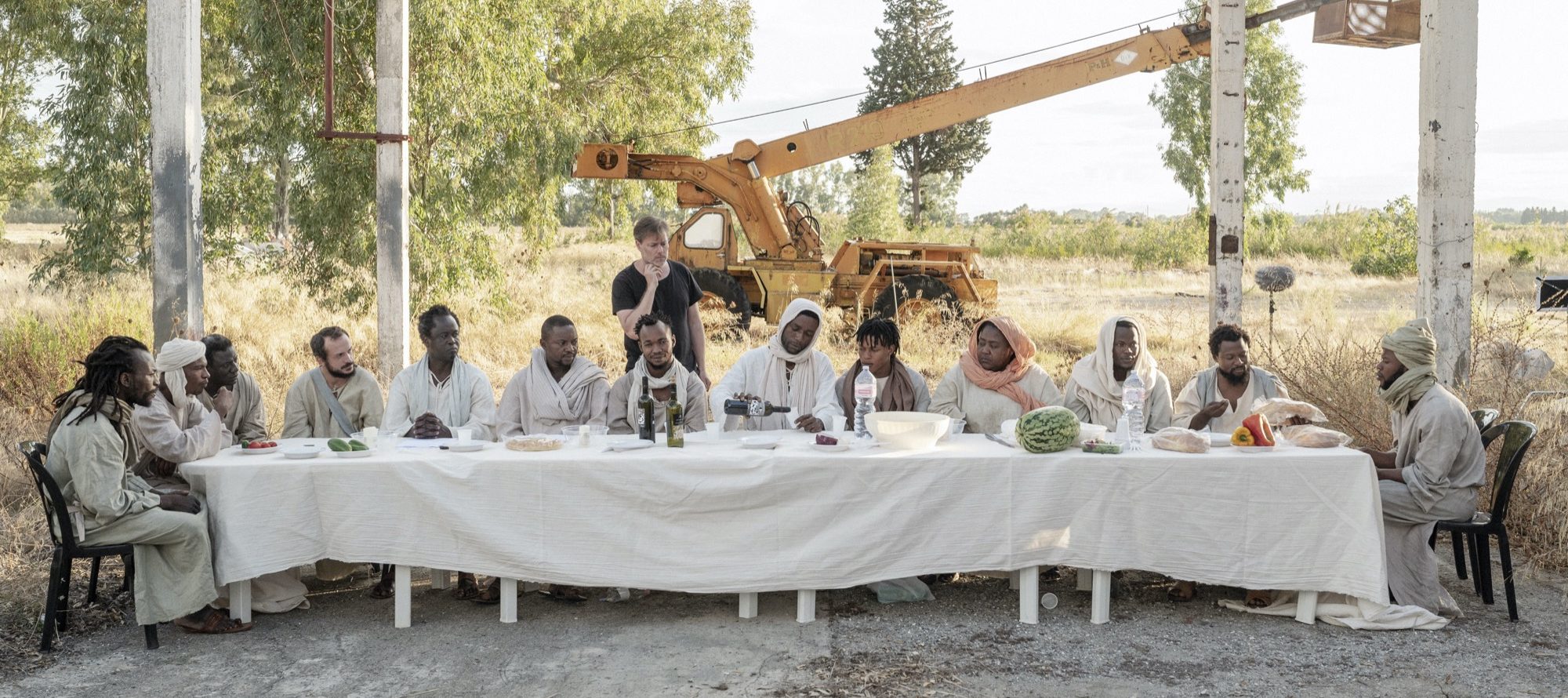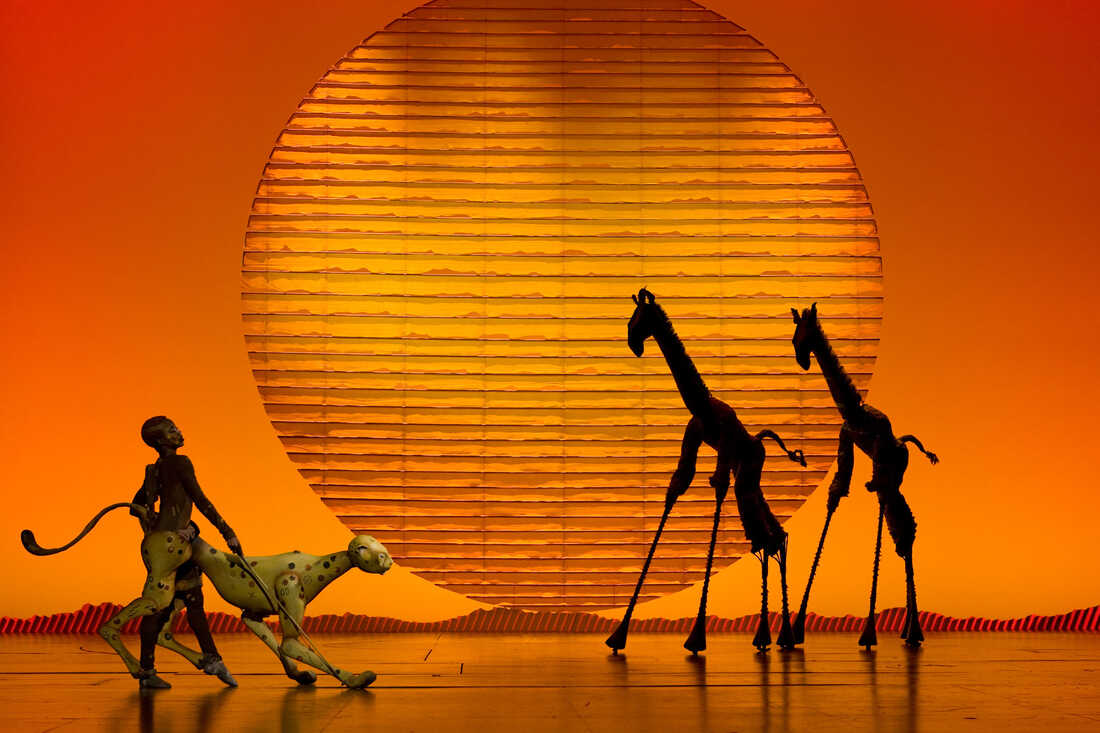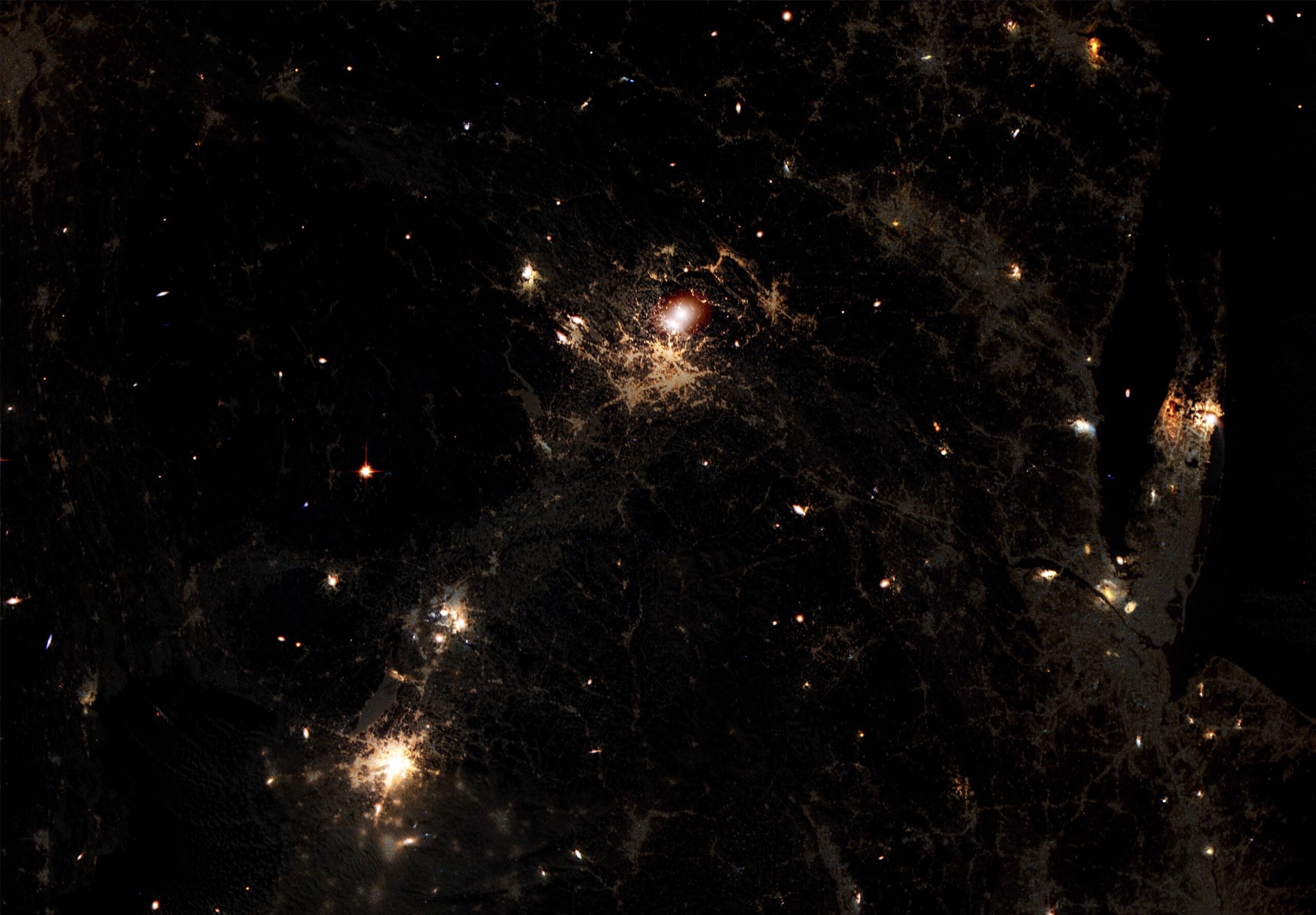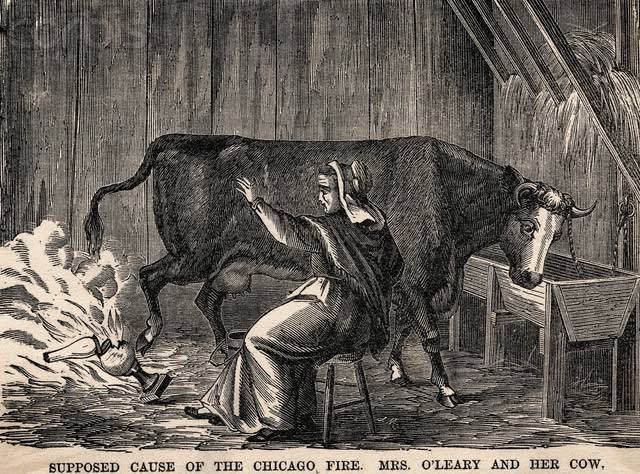“It’s a hybrid film. It’s half documentary and half bible.” So describes Milo Rau, Extended Play advisory board member and arguably the most controversial practitioner of documentary theatre in Europe, when interviewed about his 2019 film The New Gospel. An interdisciplinary production, or rather, a process, The New Gospel stems from a political campaign for migrant farm workers in Southern Italy, investigates its actual events, leaders, and participants, and extracts its course of resistance into a contemporary biblical fable on the silver screen—not only as a mystified historical account of the campaign itself, but also a documentary of The New Gospel’s own creative process. In the 110-minute run, The New Gospel takes us on a three-fold journey: the life and death of the most influential religious founder in the history of the world, the pursuit of migrant worker activists of legal rights and fair pay, and the making of the film that reconnects the ancient (and stalled, perhaps) spiritual tradition with its secular socio-revolutionary roots.

Matera, a small town in Basilicata, Italy, is an elaborate site choice that serves Milo Rau’s vision of hybridity. A historical town dating back to Graeco-Roman ages, Matera’s primeval look has made it a screen double for ancient Jerusalem since the 1960s, featured in renowned biblical period films such as Pasolini’s The Gospel According to St Matthew (1964) and Mel Gibson’s The Passion of the Christ (2004). However, what is hidden behind Matera’s archaic scenery is the modern socio-economic system that sustains its aura and cultural functionality. The agricultural corporations in Southern Italy rely heavily on the cheap labor of migrants who came to Europe across the Mediterranean. Oftentimes not able to obtain legal residency in EU, a large number of African migrant workers is forced to endure heavy physical labor with meagre wage, destitute of sufficient housing or healthcare conditions. In this group of migrant workers, Milo Rau and his creative team find a contemporary counterpart to the very original bedrock of Christianity—the displaced, denied, and deprived human beings summoned under a solitary call against the exploitative system—whether the ancient Roman empire, or the modern capitalist agricultural industry and the EU state apparatus.

Yvan Sagnet is one of the migrant workers. In 2011, he came from Cameron to Italy, and worked as a seasonal low-wage farmhand in a tomato plantation near Nardò. For Yvan Sagnet, his fellow workers are essentially living in the same circumstance as slaves two millennia ago. Despite their labor congealed in all kinds of farm products that circulate restlessly in the markets and households of Italy, the migrant workers themselves are deprived of proper means to sustain their basic needs to survive in this country. Moreover, these workers constantly suffer from inhumane torture and humiliation from gang masters and landowners. Yvan’s experience is reflected in an interview at the very beginning of The New Gospel. At a humble shelter in the Matera ghetto, an African farmworker tells Milo Rau in front of the camera that he has to work at an hour wage of merely 5 Euro because he has no rights to argue for a fair salary as an illegal immigrant. Determined to bring change to this unbearable situation of modern slavery, Yvan dedicates himself to social activism. Since 2011, Yvan has been organizing strikes among his co-workers in the tomato field, and has been making efforts to bring their struggles to legislative and institutional levels, which is pressing the Italian justice system to respond to the discontent of migrant workers.

With The New Gospel, Milo Rau is inciting the Italian and European society to reconsider the contemporary relevance of their spiritual foundation, to interrogate who Jesus would be today, and what Jesus would do. Rau proposes a radical answer in his artistic choice to cast Yvan Sagnet as Jesus and the migrant farmworkers involved in Yvan’s activism as the disciples. For a hybrid text, it is an unavoidable question whether The New Gospel intends to pose a religious reading upon Yvan’s campaign that could threaten to diminish its materialist socio-economic pursuits, or if the film is citing from the core canon of Christianity in order to articulate its political connotation. Instead of limiting The New Gospel’s interpretative potential on either way of thinking, Milo Rau and Yvan Sagnet are trying to synthesize spirituality, the omnipresent base-color of Southern European everyday life, and political activism, the most urgent endeavor to end injustice hidden behind the seemingly peaceful mechanism that supports this way of life.
Yvan Sagnet himself was raised with Catholic upbringings; but the actual struggle of life brought a Marxist touch to his understanding of the Gospels. Yvan remarks: “When you start to read the New Testament, you have a guy who’s an activist for the landless people and the periphery of the Roman Empire: that is exactly the situation that we have in Italy now. In the New Testament, the apostles are all migrants who have lost their homes because of the invasions of the Romans, which is exactly the situation in Italy now.” A bold yet invigorating re-interpreter of Christian preachings, Yvan embodies a Marxist Jesus in The New Gospel—“For me one sentence from the Bible became the leading sentence of our film, when Jesus says, ‘Do not think that I have come to abolish the Law or the Prophets; I have not come to abolish them but to fulfill them’”. Yvan’s activism, as well as his performance in the film as Jesus, is a powerful reminder that the requests for justice and human dignity are already written in the European and Italian law; the only question is to fulfill them. Yvan’s purpose has never been political activism against capitalism per se, but rather the revolutionary reiteration of the long European tradition, however stale and irrelevant it might seem.

As an advocate of process over product, Milo Rau and his theatre-activism company International Institute of Political Murders (IIPM) bring Yvan’s agenda one step forward—not merely into the artistic crystallization of documentary film, but also an actual social movement called Rivolta della Dignita (Revolt of Dignity). According to Milo Rau:
“I think it really has become a biblical film adaptation for our time, with the first black Jesus in European film history and with a cast that is diverse in the best sense of the word. Besides international stars and politicians, activists, farm workers and normal citizens play the leading roles. Mary Magdalene is a main figure in our film, some of the apostles are female and – interesting fact – most of the apostles of our “new” Jesus are of Muslim faith. But what pleases me most is that our film had a real impact. As a consequence of the “Revolt of Dignity”, as you can see at the end of the film, the first “Houses of Dignity” were founded around Matera: houses where the previously homeless extras of the film can now live in dignity and self-determination. And this with the support of the Catholic Church!”
Such a keen combination of art and activism is the most crucial guideline for Milo Rau. In IIPM and NT Ghent, where he works as the artistic director, Milo Rau has been practicing his unique, contemporary understanding of Gesamtkunstwerk—there is no boundary between art and life, artworks and social conflicts, art production and “mundane” labor, or art institutions and communities. Upon his appointment in 2018 at NT Ghent, Milo Rau published ten rules as the guideline of his theatrical practice, known as The Ghent Manifesto. The three most fundamental rules read as below:
“One: It’s not just about portraying the world anymore. It’s about changing it. The aim is not to depict the real, but to make the representation itself real.
Two: Theatre is not a product; it is a production process. Research, castings, rehearsals, and related debates must be publicly accessible.
Three: The authorship is entirely up to those involved in the rehearsals and the performance, whatever their function may be – and to no one else.”
On July 9th and 10th 2021, Howlround and The Foundry Theatre presented the first showing of The New Gospel in the United States. Accompanying a 48-hour streaming of the film for a North American audience, two panel discussions around The New Gospel built a bridge between the topicality of European refugee crisis and the Black Lives Matter Movement in the USA. Hosted by David Bruin, a Zoom panel took place on July 9th under the title “how are artists seizing power today”. Milo Rau, Luis Alfaro, Marc Bamuthi Joseph, Alec Duffy and Emily Johnson were engaged in a heated discussion around a series of artists-led movements at the onset of COVID-19 and the murder of George Floyd, and reflected on the political art making methodologies in the American theatre. On the following day, Dread Scott, Kristina Wong, Virginia Grise, Toshi Reagon and Carlton Turner gathered online in response to the question, “how are artists and organizers building solidarity between art and movements.”

Community was undoubtedly the top one keyword in every artist’s vocabulary. Against the broken landscape of the American identity upon the pandemic and systemic racism, artists are almost desperate to suture the wounds within and between communities with artistic attempts and institutional reformations. Behind initiatives like WeSeeYouWhite American Theatre, Amplifying Activism and so on, there has been a constant endeavor to establish a sense of collective and solidarity, to expand the inclusiveness of communities, to cure the social pathogens embedded in the genetics of art institutions in order to change the whole social system—in spite of the formalism, rosiness and idealist naivety these slogans might be charged with.
Among his American colleagues, Milo Rau was particularly quiet in the conversation around his work, seemingly due to the absence of the real protagonist on and off the screen, Yvan Sagnet, along with his fellow African farmworkers. BLM protests and racism in America have never been neglected in the agenda of The New Gospel despite its Europe specific subject matter. There is a scene in The New Gospel when a white Italian Matera local is auditioning for the role of a Roman soldier, and he mimics a violent racist attack as if torturing Jesus. This highly disturbing moment triggered an emotional exchange in the Zoom room around the sadistic drive behind racist hate crimes in the white American collective unconscious; however, for Yvan Sagnet and Milo Rau, what’s more disturbing than the manifestation of hate crimes is the dialectical moment after this scene, where the violent white actor seamlessly transforms into the soft, mild-mannered disciple that gently takes the black Jesus down from the cross.

Yvan comments: “The film is saying: There is evil in humans, but it comes from somewhere. We are always talking about racism, but we’re not connecting it with where this violence comes from.” Milo Rau proposes a deeper investigation in the violent structure of globalized capitalism where the core of racism is rooted. Such investigation is manifested in the real, raw footage of black bodies laboring in the beautiful, idyllic tomato gardens around Matera. It can’t be articulated or carried out in a Zoom room or an art institution. It takes you deeper into the field. It takes you out there into the world.
To learn more about The Civilians and to access exclusive discounts to shows, join our email list at TheCivilians.org.
Author
-

Siting Yang (she/her) is an interdisciplinary theater maker based in Beijing and NYC. Her body of work is motivated by a twofold impulse: revolution and nostalgia. By revolution, she seeks to explore radical aesthetical expressions of individual discontent, resistance, and digression in the oppressive system of everyday life. By nostalgia, she collects stories from the trajectory of history and literature that resonate with our modern souls, and reshape them with contemporary relevance. Her recent credits include: HoD (New York, 2021), The Tin Drum (Toronto, 2021), War Eagle (Beijing, 2019), Marat/Sade (Beijing, 2018). She received her B. A. at Peking University in German Literature and World History, and is currently pursuing her MFA in dramaturgy at Columbia University.










